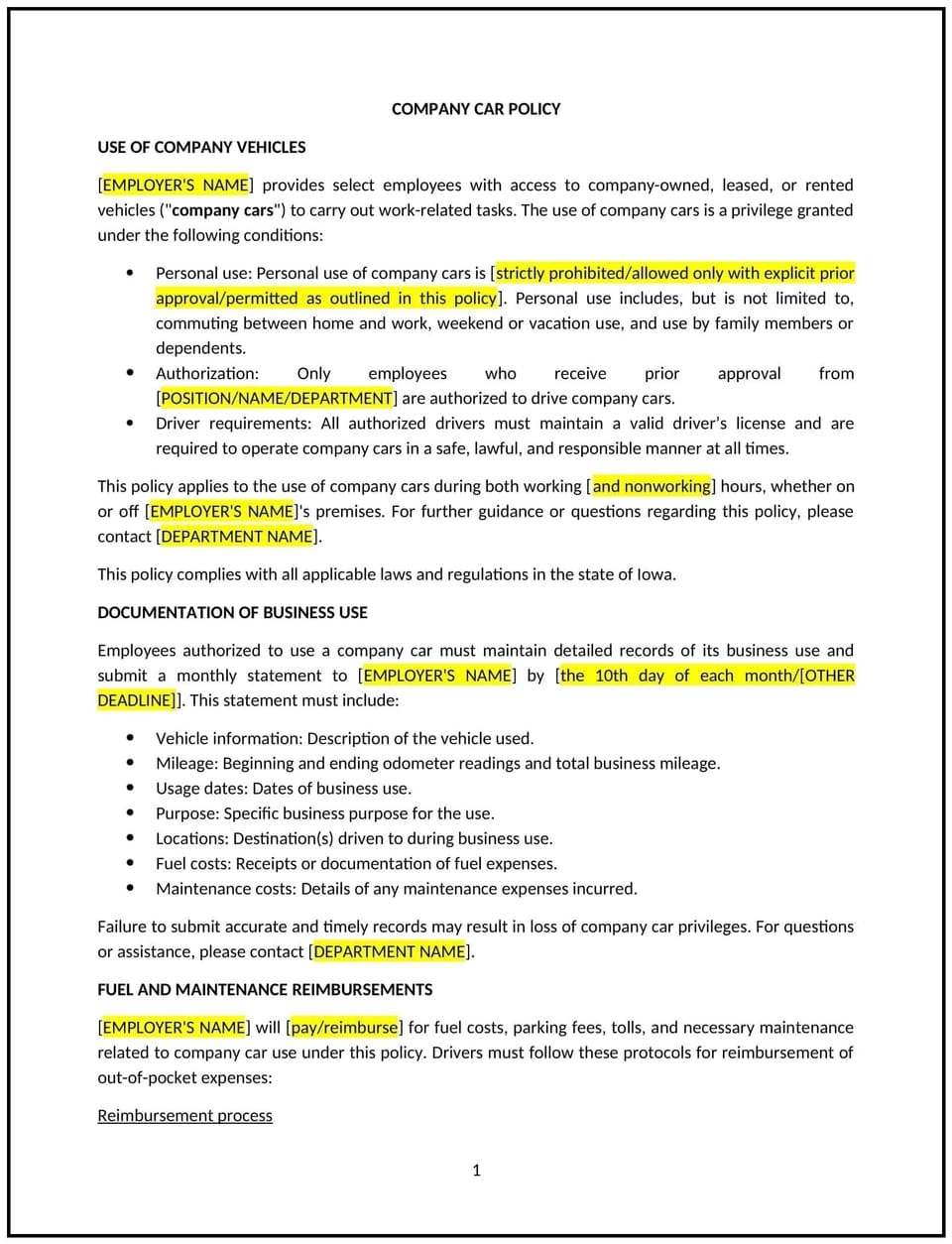Company car policy (Iowa): Free template

Company car policy (Iowa)
A company car policy helps Iowa businesses establish guidelines for the use of company-owned vehicles for work-related purposes. Providing a company car can be beneficial for employees who frequently travel for business, but businesses need clear rules on eligibility, maintenance, and acceptable use to manage costs and liability effectively.
This policy outlines eligibility criteria, driver responsibilities, and permitted vehicle usage. It helps businesses promote safe driving practices while ensuring company assets are used appropriately.
By implementing this policy, businesses in Iowa can improve operational efficiency, reduce vehicle-related risks, and establish clear expectations for employees using company cars.
How to use this company car policy (Iowa)
- Define eligibility criteria: Specify which employees qualify for a company car based on job role, travel requirements, or seniority.
- Set permitted usage: Clarify whether company vehicles may be used for personal errands or strictly for business purposes.
- Establish driver responsibilities: Require employees to follow safe driving practices, maintain insurance, and report any accidents or violations.
- Outline maintenance and fuel expenses: Specify who is responsible for routine vehicle maintenance, fuel costs, and repairs.
- Address accident and violation reporting: Require employees to report any incidents immediately and cooperate with investigations.
- Implement safety guidelines: Establish expectations for seatbelt use, mobile phone restrictions, and adherence to Iowa traffic laws.
- Set vehicle return procedures: Clarify the process for returning the vehicle in cases of job termination, extended leave, or policy violations.
- Review and update: Regularly assess the policy to reflect business needs, insurance requirements, and legal changes.
Benefits of using this company car policy (Iowa)
This policy offers several advantages for Iowa businesses:
- Improves operational efficiency: Provides reliable transportation for work-related travel.
- Reduces liability risks: Establishes clear guidelines for vehicle use and accident reporting.
- Enhances employee accountability: Ensures employees use company vehicles responsibly.
- Minimizes maintenance costs: Encourages proper vehicle care and reporting of issues.
- Supports workplace safety: Promotes responsible driving behavior and adherence to traffic laws.
- Provides cost control: Helps businesses manage fuel expenses, insurance, and maintenance costs effectively.
Tips for using this company car policy (Iowa)
- Define vehicle use limitations: Businesses should clarify whether company vehicles can be used for personal reasons.
- Establish fuel and maintenance policies: Businesses should determine who is responsible for expenses such as gas, routine maintenance, and repairs.
- Require valid driver’s licenses: Businesses should verify that employees hold a valid Iowa driver’s license before assigning a company vehicle.
- Implement tracking measures: Businesses should consider GPS tracking or mileage logs to monitor vehicle usage.
- Address accident procedures: Businesses should provide employees with clear steps to follow in case of an accident or traffic violation.
- Review policy regularly: Businesses should update guidelines as vehicle-related expenses and legal requirements evolve.
Q: Why should Iowa businesses implement a company car policy?
A: Businesses should establish this policy to set clear expectations for vehicle use, manage costs, and promote safe driving practices.
Q: Can employees use company vehicles for personal errands?
A: Businesses should determine whether personal use is allowed and specify any limitations in the policy.
Q: Who is responsible for fuel and maintenance costs?
A: Businesses should clarify whether employees need to cover fuel costs upfront for reimbursement or if the company provides a fuel card.
Q: What should employees do if they are involved in an accident?
A: Businesses should require employees to report accidents immediately, follow insurance procedures, and cooperate with any investigations.
Q: Can businesses track company vehicle usage?
A: Businesses should outline whether they use GPS tracking, mileage logs, or other monitoring tools to ensure proper use of company cars.
Q: What happens if an employee gets a traffic violation while driving a company car?
A: Businesses should state whether employees are personally responsible for fines and how repeated violations may impact their eligibility for a company vehicle.
Q: How often should businesses review their company car policy?
A: Businesses should review the policy annually or whenever fleet management costs, insurance terms, or legal requirements change.
Q: What steps should businesses take when an employee leaves the company?
A: Businesses should require employees to return the vehicle promptly and inspect it for damages before reassigning it.
This article contains general legal information and does not contain legal advice. Cobrief is not a law firm or a substitute for an attorney or law firm. The law is complex and changes often. For legal advice, please ask a lawyer.


